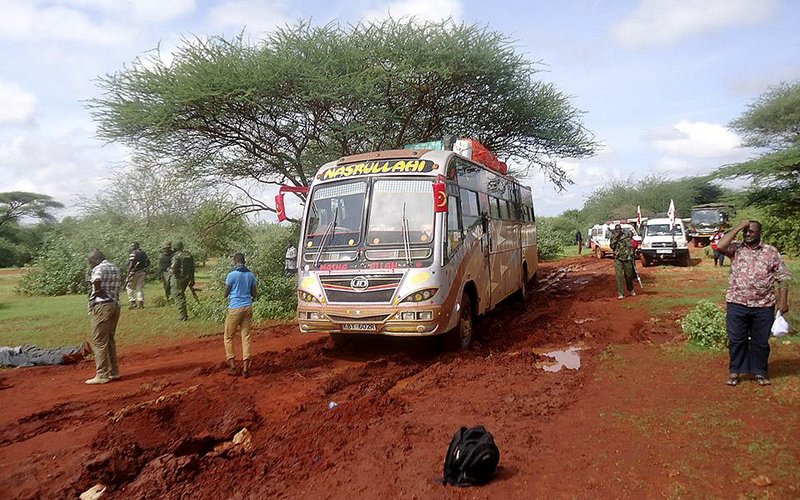NAIROBI, Kenya -- Somalia's Islamic extremist group, al-Shabab, attacked a bus in northern Kenya at dawn Saturday, singling out and killing 28 passengers who could not recite an Islamic creed and were assumed to be non-Muslims, Kenyan police said.
Those who could not say the Shahada, a tenet of the Muslim faith, were shot at close range, a survivor said.
Nineteen men and nine women were killed in the bus attack, Kenyan Police Chief David Kimaiyo said.
Al-Shabab claimed responsibility for the killings through its radio station in Somalia, saying it was in retaliation for raids by Kenyan security forces carried out last week on four mosques at the Kenyan coast.
"The Mujahedeen intercepted a bus, which had on board a group of Christians that enjoyed the killing and the maiming of Muslims," al-Shabab spokesman Sheikh Ali Mohamed Rageh said in a statement read on Radio Andulus, a pro-al-Shabaab broadcaster.
"That attack is payback for the actions of their fellow Christian soldiers in Kenya that killed many innocent Muslims at prayers in a mosque in Mombasa over the past week," Rageh said.
Kenya's military said it responded to the killings with airstrikes later Saturday that destroyed the attackers' camp in Somalia and killed 45 militants.
"The attackers' camp, located in Somalia, was destroyed this morning," Kenya Defense Forces spokesman Col. David Obonyo said in an emailed statement. "Ground troops are in hot pursuit of the fleeing attackers."
The bus, traveling to the capital, Nairobi, with 60 passengers was hijacked about 31 miles from the town of Mandera near Kenya's border with Somalia, said two police officers who insisted on anonymity because they were ordered not to speak to the media.
The attackers first tried to wave the bus down, but it didn't stop, so the gunmen opened fire, the policemen said. When that didn't work, they fired a rocket-propelled grenade, the officers said.
The gunmen took control of the vehicle and forced it off the road, where they ordered all the passengers out and separated those who appeared to be non-Muslims -- mostly non-Somalis -- from the rest.
George Ochwodho, a non-Muslim head teacher of a private primary school in Mandera, survived the attack. He was traveling home for Christmas vacation because the school had closed.
Ochwodho said the passengers who did not look Somali were separated from the others. The non-Somali passengers were then asked to recite the Shahada, an Islamic creed declaring oneness with God. Those who couldn't recite the creed were ordered to lie down. Ochwodho was among those who had to lie on the ground.
Two gunmen started shooting those on the ground; one gunman started from the left and other from the right, Ochwodho said. When they reached him they were confused on whether either had shot him, he said.
Ochwodho lay still until the gunmen left, he said. He then ran back to the road and got a lift from a pickup back to Mandara, where he was rushed to hospital.
He spoke from a hospital bed where he was being treated for shock.
Seventeen of the 28 dead were teachers, the police commander in Mandera County said.
A shortage of personnel and lack of equipment led to a slow response by police when the information was received, said two police officers who insisted on anonymity because they were ordered not to speak to journalists.
They said the attackers have more sophisticated weaponry than the police, who waited for military reinforcements before responding.
"The United States condemns in the strongest terms today's horrific attack in Kenya by the terrorist group al-Shabab against innocent civilians," said Bernadette Meehan, the spokesman for the National Security Council in Washington.
"The United States stands with our Kenyan partners in the effort to counter the threat of terrorism and affirms our ongoing commitment to working with all Kenyans to combat these atrocities," her statement said.
Kenya has been hit by a series of gun and bomb attacks blamed on the al-Shabab group, which is linked to al-Qaida, since it sent troops into Somalia in October 2011. Authorities say there have been at least 135 attacks by al-Shabab since then, including the assault on Nairobi's upscale Westgate Mall in September 2013 in which 67 people were killed. Al-Shabab said it was responsible for other attacks on Kenya's coast earlier this year that killed at least 90 people.
Al-Shabab is becoming "more entrenched and a graver threat to Kenya," warned the International Crisis Group in a September report to mark the first anniversary of the Westgate attack. The report states that the Islamic extremists are taking advantage of long-standing grievances of Kenya's Muslim community, such as official discrimination and marginalization.
Kenya has been struggling to contain growing extremism in the country. Last week, the authorities shut down four mosques at the Kenyan coast after police alleged they found explosives and a gun when they raided the places of worship.
Some Muslims believe the police planted the weapons to justify closing the mosques, Kheled Khalifa, a human-rights official, said Friday, warning that methods being used to tackle extremism by government will increase support for radicals.
One person was killed during the raid on two of the mosques Monday. Police said they shot dead a young man trying to hurl a grenade at them.
The government had previously said the four mosques were recruitment centers for al-Shabab.
Al-Shabaab also reiterated its call for Kenyan forces to withdraw from Somalia.
"We have in the past warned you to stop the bloody massacre of innocent Muslims both in our country, Somalia, and Kenya and again we warn you think about the lesser of two evils," Rageh said.
Al-Shabaab in June warned foreign tourists not to visit the country because the country is a "war zone."
Information for this article was contributed by Tom Odula and Abdi Guled of The Associated Press and by Abjata Khalif and Mohamed Sheikh Nor of Bloomberg News.
A Section on 11/23/2014

